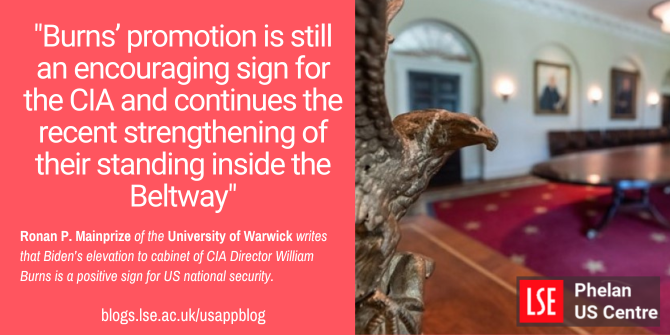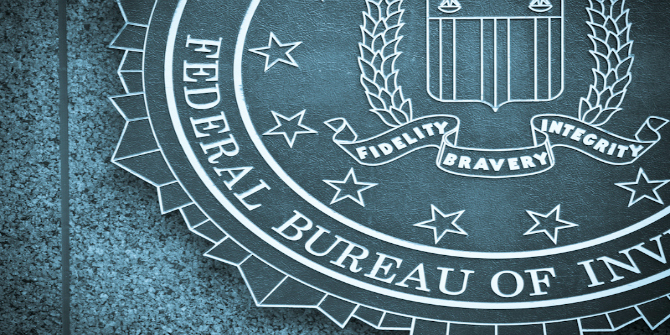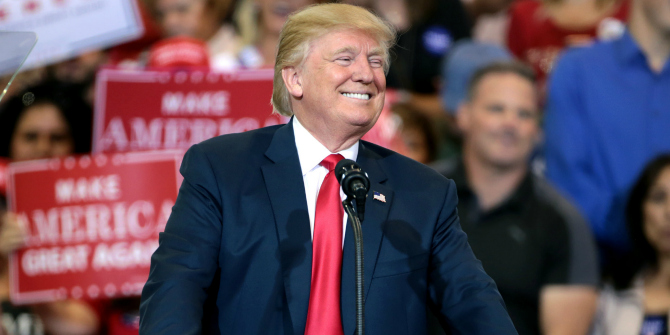 Last month the Director of the Central Intelligence Agency, William Burns, was elevated to a position in President Biden’s cabinet. Ronan P. Mainprize writes that the move is a victory for human intelligence and reflects President Biden’s more agreeable relationship with, and trust in, the CIA compared to many of his predecessors. While it may not lead to greater influence on US foreign policy by the CIA, the move does potentially strengthen the White House’s’ ability to predict and react to foreign conflicts and threats.
Last month the Director of the Central Intelligence Agency, William Burns, was elevated to a position in President Biden’s cabinet. Ronan P. Mainprize writes that the move is a victory for human intelligence and reflects President Biden’s more agreeable relationship with, and trust in, the CIA compared to many of his predecessors. While it may not lead to greater influence on US foreign policy by the CIA, the move does potentially strengthen the White House’s’ ability to predict and react to foreign conflicts and threats.
2023 is proving to be an interesting year for American intelligence. War in Ukraine, Chinese spy balloons, a 21-year old leaker, a former President leaving classified documents in his bathroom; there has hardly been a quiet moment. And on Friday 21st July, the Director of the Central Intelligence Agency (CIA), a post currently held by William Burns, was elevated to a cabinet position by President Joe Biden. This is not an unprecedented or particularly surprising move, and it does not mean the CIA now has an enhanced role in foreign policy formulation. But it is still a positive sign for Burns, the CIA, and US national security more broadly.
An often-fraught relationship between the CIA and the White House
Throughout the CIA’s now 76-year history, relations between Langley (the CIA’s home in Virginia) and the White House have often been turbulent, fraught with difficulties, and only rarely harmonious. Indeed, American Presidents have a lengthy record of contempt for the CIA and their Directors. Harry Truman branded them an ‘American gestapo’, Lyndon Johnson likened them to ‘a s**t-smeared tail’, Richard Nixon labelled them ‘clowns’, and Donald Trump tweeted that they were nothing more than ‘Nazis.’
Yet President Biden has maintained a comparatively more agreeable relationship with the CIA during his time in the Oval Office. Scholars have noted that he is generally pro-intelligence and that he sees value in the CIA’s work, often praising their officers and analysts. Building on his vast experience with intelligence throughout a lengthy career in both the legislative and executive branches, Biden has offered the Agency calm waters after the storm of the Trump administration. Something which will not have been overlooked by members of the American intelligence community.

P20210714AS-0114 by The White House is United States government work.
William Burns’ role in this rejuvenated relationship has thus far been significant. The former diplomat, who previously served as ambassador to both Jordan and Russia, has taken on a variety of different functions for the Biden administration. In addition to managing the largest US espionage service, he has also been deployed in several attempts to quell international tensions through ‘intelligence-diplomacy’, meeting with the Taliban during the 2021 US withdrawal from Afghanistan and more recently holding clandestine conferences with his Russian and Chinese counterparts. His diplomatic experience evidently predisposes him to such tasks, but the level of trust placed in him by Biden is still noteworthy.
In the room but little influence?
Burns’ new place in the cabinet will only raise his personal standing further, yet it does not necessarily mean that the Director, or by extension the CIA, will now be taking part in the creation of foreign policy. Modern cabinet meetings are not the centre of important policy making they have previously been, and it has been clear that the current President only uses intelligence to help him understand the world, and not to shape it. Biden is a keen consumer of intelligence, appreciating the objective and non-politicised information it can provide, but history shows that having a place in a President’s inner sanctum does not automatically mean a CIA Director holds any influence.
Nevertheless, Burns’ promotion is still an encouraging sign for the CIA and continues the recent strengthening of their standing inside the Beltway. The Agency has always been the most powerful US intelligence service, complimented by the largest budget, but the ‘War on Terror’ and the turbulence of the Trump years saw their reputation take several knocks. Public perceptions of the Agency were in a deep trough. Yet the Biden presidency has seen a gradual re-emergence in the CIA’s prominence, with the accurate and timely prediction of Putin’s full-scale invasion of Ukraine in February 2022 being a highlight. Burns may not have acquired newfound influence, but his place in the cabinet is nonetheless indicative of the CIA’s rebuilding status.
A victory for human intelligence
The new move will also stand as a victory for the collectors of, and advocates for, human intelligence. In an increasingly data-driven world, the role of technology in intelligence operations has grown rapidly, whether it is telecommunications interception via satellites, open-source collection, or the use of artificial intelligence. In this brave new world, complete with a diverse group of eighteen American intelligence agencies, you would be forgiven for thinking that the CIA, which is the US’ human intelligence collector, is perhaps beginning to lose its importance. But this could not be further from the truth, and Burns’ place in the cabinet only proves again that the value of human intelligence remains high and is not going to decline anytime soon.
There are still some minor clarifications needed regarding Biden’s move. With Director of National Intelligence (DNI) – which oversees all US intelligence community operations – Avril Haines already attending cabinet, questions may arise over who the principal intelligence advisor to Biden is. Yet these are only minor, perhaps irrelevant, formalities, especially considering Burns’ recent statement that he was “honored to serve” and to work “under the leadership of DNI Avril Haines”. Ultimately, this is a positive move on many accounts. With the rising probability of conflict with China, this is a critical moment for US national security. In such a moment, the White House needs a close and co-operative relationship with the CIA and its intelligence. Biden’s latest move will give it exactly that.
- Please read our comments policy before commenting.
- Note: This article gives the views of the author, and not the position of USAPP – American Politics and Policy, nor the London School of Economics.
- Shortened URL for this post: https://bit.ly/3OJnZDm






